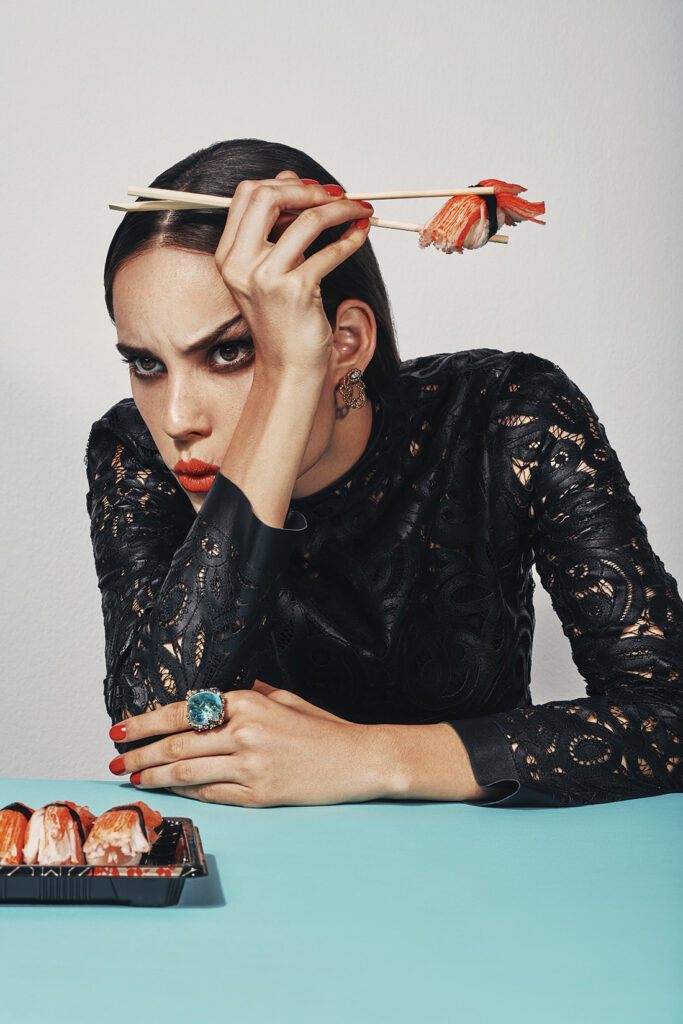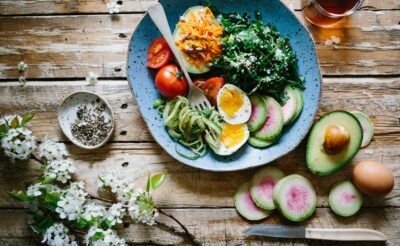The destructive potential of food shaming is a very real problem… and the biggest problem is that we might just be inflicting it on ourselves
When it comes to the pressures we face on how to look, it’s not simply the long-standing new year or summer body request that still prevails. It’s often actually about what we eat in general. The worst part of it all? Much of that pressure comes from ourselves. An anxiety woven so deeply into the fabric of our culture, most of the time it’s done subconsciously. But one thing is very real: The moralisation of food, and the language we use to discuss it, needs to be reformed… and the time is now.
“Food shaming is the act of judging someone’s choices when it comes to eating and food,” explains Lina Shibib, a Clinical Nutritionist at Medcare Hospitals and Medical Centres. The main problem is that it’s not always obvious. “Food shaming isn’t necessarily direct. Sometimes you may even experience it without noticing,” explains Ghalia Amin, a body activist and model from Saudi Arabia. You have the more obvious messages like calls to “detox our bodies” on social media and “say goodbye to junk food” in print, but they are only part of the problem. It is so ingrained in our culture, food shaming often comes from our friends and family and, even worse, ourselves. “From joking about cheat meals to ‘treating’ ourselves with dessert, we are normalising this act without even consciously realising it. The consequences can be harmful.

Photographed by Greg Adamski
“Food ‘rules’ are formed, often leading to ‘food guilt’, ‘food anxiety’, and disordered eating patterns and behaviours,” explains Farah Hillou, a nutritionist at The Chiron Clinic in Dubai. Starting from a young age, this can manifest into even worse negative eating habits as we get older. “As a young girl, I would try to hide what I ate, especially if it wasn’t healthy enough,” recalls Amin. The problem arises with people not aware they’re causing harm. We assume we are encouraging a healthy lifestyle by cutting out what we perceive as “bad” foods. The culprit is society’s obsession with being skinny. That skinny is beautiful and that thin people are healthy. Even at times against our better judgment, we have been told that we need to lose weight and live off a restrictive diet to get there. This is where diet culture comes into play. The centre for Disease Control and Prevention (CDC) in the US reported in November 2020 that people are dieting more than they did 10 years ago. According to a recent report this year by global market research and public opinion specialist Ipsos, that figure equates to 45 per cent of the world’s population trying to lose weight.
Much like fashion trends, diets change year on year, queue Keto, Atkins, Weight Watchers and Paleo, among others jostling for the top spot. The stark truth is that 98 per cent of all diets are unsuccessful. “Diet culture is basically following dietary rules and restrictions that are not sustainable, can be dangerously unhealthy and are usually trendy,” says Sandra Sharpe, a functional medicine health coach in Dubai. Nobody is safe from diet culture with women, men and even young girls being targeted. “It tells people that they are never enough to live the full life they always dreamt of unless they manage to reach a certain weight. And, of course, that’s one of its biggest lies. You can live a full life, at any weight,” declares Amin.

Photographed by Greg Adamski
Everyone is different. This is the major flaw in diets that offer a one size fits all approach. From genetics to age and even environmental factors like where you live, every person’s body needs different nutrients to thrive. “These diets often prioritise being thin and weight loss over emotional, mental and physical well-being,” adds Sharpe. Not all people that are perceived as “fat” are “unhealthy”. Just look at the Olympics. Athletes come in all different shapes and sizes, yet all are in peak physical condition. Some healthcare professionals are finding new ways to measure health. For example, instead of focusing on a patient’s Body Mass Index (BMI), which measures our ratio of weight to height, they are instead looking at indicators like blood pressure, cholesterol, and hormone levels. Yes, BMI can be helpful to determine people’s risk of certain chronic conditions like heart disease and diabetes, but it doesn’t work for everyone. Even if you find yourself a few kilos overweight, you could still be eating healthy and exercising on a daily basis. Enter the anti-diet movement. This isn’t encouraging people to be opposed to health and nutrition. The aim is to block out the noise and focus on evidence-based measures of what it really means to be healthy. It’s about how you feel, if you have energy and can climb the stairs without losing breath, rather than how you look. It’s also important to note that people underweight can also be unhealthy, suffering from malnutrition, vitamin deficiencies, or even anaemia.

Photographed by Greg Adamski
Body positivity is on the rise. Activists like Amin are helping change the way we think as a society. “I think every little girl or even woman should look at any movie, show, advertisement or even a magazine and see someone that she can relate to,” she says. The anti-diet movement has a lot of work to do. It’s not just rejecting diets; it’s also changing decades of discrimination. Thin privilege and weight stigma are very real and will take a long time to be recognised before there is any chance of overcoming them. “Diet culture over the years has done a lot of damage. Now it’s all about mending and reshaping these thoughts and habits while addressing the root causes of why they formed in the first place. A lot of the time, they stem from deeper insecurities, emotions and stress,” explains Sharpe. For many, it’s about finding someone to guide them on the journey, whether that be a qualified nutritionist or health coach. Being able to make informed decisions for your own body is the goal. “Nutrition therapy is an enlightening practice to those uneducated on the nuances of diet and physiology. It is important to always act in the best interest of your body and listen to yourself and professionals,” advises Shibib. This allows you to make sustainable changes.

Photographed by Greg Adamski
Journaling is one of the suggestions Hillou offers to her clients. She adds, “Working with professionals specialised in intuitive eating or mindfulness can also support you on your healing journey.” Intuitive eating was created in 1995 by Californian based dietitians Evelyn Tribole and Elyse Resch, who released a book titled Intuitive Eating: A Revolutionary Anti-Diet Approach. They highlighted how by listening to internal cues rather than external rules, individuals could guide themselves successfully in what, when and how much they should eat. Intuitive eating encompasses wellness. It’s a holistic approach that takes the stress out of eating, therefore protecting your mental health and preserving your physical health. It allows you to take pleasure in food again, understanding that eating is tied to emotion, celebration, community, and pleasure. Of course, it takes time to master. Those with conditions like emotional eating, as an example, need to figure out ways to stop relying on food as a coping strategy. “We need to be more conscientious in terms of who and what we surround ourselves with. Energies are contagious. We need to encircle ourselves with like-minded people who share common values when it comes to health and eating,” advises Hillou. No matter your size, it’s time to take control of your body. Listen to what it needs both mentally and physically and if that involves having a slice of cake, then do so without judgement.
Read Next: What Is The Keto Diet And How Healthy Is It?
- Words by Alexandra Venison





